Editor’s note: In the first two installments of this series, Larry Mullins explained how Furniture World readers can identify and develop productive and mutually beneficial relationships with the toughest and most elusive personality types. Read on to find out how to turn the focus of what you learned about personality types back on yourself in order to significantly improve sales performance. For those of you who missed the first two installments, please visit www.furninfo.com /series/difficultcustomers.
Want to be tops in sales? Then you must learn to operate in the fifth quadrant. This is the zone of flow, where all great performers and athletes operate. We discussed four other quadrants of behavior in the first two articles of this series.
The fifth quadrant is a small section of the fourth quadrant where behavior is perfectly balanced between aggressiveness and compassion, between self-interest and client interest; a quadrant of enlightened self-interest. If you master the fifth quadrant, you will not only be a great salesperson, you will be in the top one percent of world-class, peak performers. Fifth quadrant (Q-5) mastery is the most important sales skill you will ever learn.
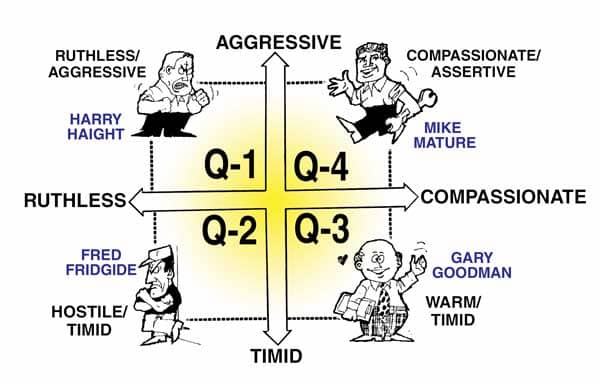
Perhaps the best way to understand the Q-5 Salesperson is to think in terms of a generalization of common masculine/feminine gender-attitudes. A Q-4 assertive male is naturally daring, willing to confront risk and challenge. All good things. A Q-4 compassionate female is caring, compassionate, nurturing, empathetic and considerate. Once again, all good things. The problems begin when the male gets too assertive, too daring, too aggressive and insensitive to others. Likewise, it does not work when the female is too compassionate and nurturing to the point of being enabling. Then she gets run over and taken advantage of by more assertive personalities.
The solution is likely not what you may think. Many individuals with a healthy, adventurous and assertive personality may fear they are too pushy, and then strive to curb these traits rather than cultivate an equal degree of empathy and caring for others. Such people with a bit too much self-esteem need to understand that it is not possible to have authentic, impregnable self-respect to a greater degree than they have respect for others. What we are seeking in the Q-5 zone is an exquisite balance of confidence and love. Yes, I did write love; defining love in this instance as the desire to do good to others. On the other side of the spectrum, people may decide that because they are being taken advantage of, they must curb their natural compassionate nature Instead, these people should rather strive to develop a healthy assertiveness to balance out their deep empathy for others.
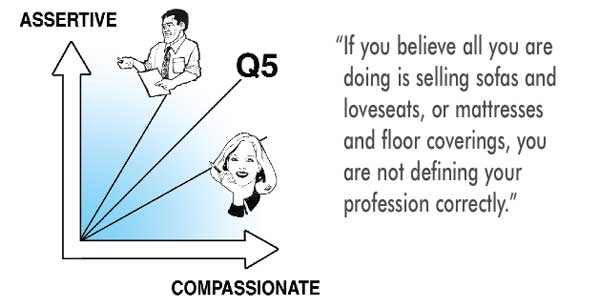
The ultimate salespersons then, are those with impregnable self-respect and an equal degree of respect for their clients. This respect for self and others leads to excellence in sales performance. I know some may find these ideas corny. However, I believe the sales profession is a noble endeavor when it is done on a level of enlightened self-interest. If you believe all you are doing is selling sofas and loveseats, or mattresses and floor coverings, you are not defining your profession correctly.
Jay Abraham said it best. I have a slightly modified version of his philosophy posted on the wall in my office:
“If you fail to value, acknowledge and respect the worth of your profession, what you do, and how much more you should be doing for your clients… If you don’t respect and revere that, it’s shameful. If you DO respect and revere that, you have a causal purpose to do even more, and to help your clients appreciate the significance of what it has meant to their lives.”
The pressure on salespeople these days is extreme. Many skilled and knowledgeable salespeople crumble because they are pressured into using aggressive sales tactics that are not natural to them. Other potentially fine salespersons allow a clerk-patron relationship to develop between them and their clients. They become obsequious and passive, and allow customers to become too dominating. What is needed is a balance. A superb self-respect modulated by a professional passion to serve.
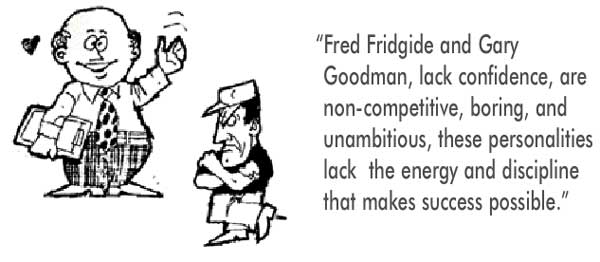
Yet, the pressure on a modern salesperson is real. How does a salesperson develop the mental toughness to deal with the pace and pressure of modern selling? The truth is that in a matter of a few minutes deals can be made or vanish, and an important commission created or lost. In this article we will examine the methods used by master athletes (and salespersons!) to embrace challenge and use its pressure to achieve excellence, and fuel successful careers. And they do this while maintaining a relaxed–yet dynamic–attitude.
Gabby Douglas and Pressure
The amazing American gymnast, Gabby Douglas, seems to have that impregnable mental toughness that we covet. Her Olympic trainer, Martha Karolyi, said of her: “Many gymnasts are doing strong skills. What makes this one different is mental toughness ... She takes the stress, which collapses many gymnasts, but it motivates her.”
Is this toughness something we are born with? Evidently not. Gabby took a long time to learn to embrace stress and make it work for her. On the other hand, few people seem to be able to do this. True, some salespersons seem to naturally have the hide of an elephant (Harry Haight, one of the personality types described in our last installment, is one example.) Harry is an aggressive, type A personality, always driving, seemingly fearless, constantly in an urgent mode. His confidence seems boundless. The downside is that Harry Haight’s Q-1 aggressiveness often offends customers, loses sales, and he is likely to blowout an aorta before he has a chance to reach his goals. But, the passive, type B personality, is not so appealing either, (Fred Fridgide and Gary Goodman, for example.) Lacking in confidence, non-competitive, boring, and unambitious, these personalities lack the fire in the belly, the energy and discipline that makes success possible.
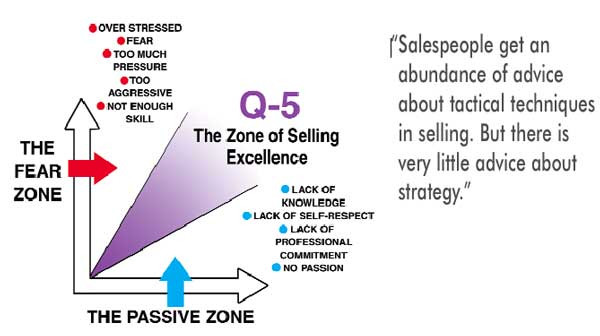
Which leaves us with Mike Mature. Like Harry, Mike is ambitious, passionate, and he also has the quality of professionalism that lifts him to important levels of achievement. What makes Mike Mature’s assertiveness more effective and easier to take than Harry Haight’s? Mike Mature operates in the Fifth Quadrant. There have been many names for the fifth quadrant over the years. When Charles Garfield was an Olympic coach he discovered that athletes can be trained to reach remarkable levels of performance, and he called it Peak Performance. Robert and Marilyn Kriegel called it the “C Zone.” Psychologist and noted author Mihaly Csikszentmihalyi calls it Flow. Abraham Maslow called it the Peak Experience.
Peak Performance Under Pressure
Fifth quadrant selling all begins with desire and commitment. Napoleon Hill wrote about it in his classic book, Think and Grow Rich: “Desire is the starting point of all achievement… not a hope, not a wish, but a keen pulsating desire that transcends everything.” Harry Haight has this desire, in fact it obsesses him. But Harry is the consummate narcissist, it’s all about him; it’s about making the sale. Mike Mature is different. His desire is tempered by a desire to serve and help his clients.
Mike loves what he does. Harry is in a rat race that compels him to make numbers. Harry sells furniture to make a living. Mike is a professional operating in a noble profession that brings more comfort and beauty to the families of the clients he serves. Mike helps people find the perfect mattress so they can greet the day without back pain, rested and refreshed and ready for anything. He assists mom and the kids as they strive to find a way to warm dad’s weary heart with the new recliner he has always wanted, and have it delivered in time for his birthday. Mike’s desire springs from this vision of what he loves to do.
If you are thinking that no one can be a peak performer all the time, you are correct. The Kriegel team “C Zone” theory noted that there is a constant dynamic that goes on as peak performers move back and forth between challenge and competence. Competence is when you achieve mastery at a certain level of performance. Challenge is when you raise the bar and take the risks necessary to take you to another level. The Kriegels wrote in their book The C Zone:
“Moving from mastery to challenge is like climbing a ladder, not an unfamiliar metaphor for achieving success. In this ascent toward the top, mastery, the achievement of competency, provides you with a strong footing and a solid base. Mastery involves remaining on a rung until you have gotten your balance and feel confident, comfortable and in control. The challenge comes when you commit yourself to taking the risk of moving up to a higher step. Initially you feel shaky at this new height. At this point you strive for mastery, to gain balance and confidence, until you are once again ready for the next challenge. The mastery/challenge shuttle… takes you from the excitement of exploring the unknown to the satisfaction and fulfillment of a job well done. It shuttles you from uncertainty to certainty and back, keeps you learning, growing and moving up the ladder.”
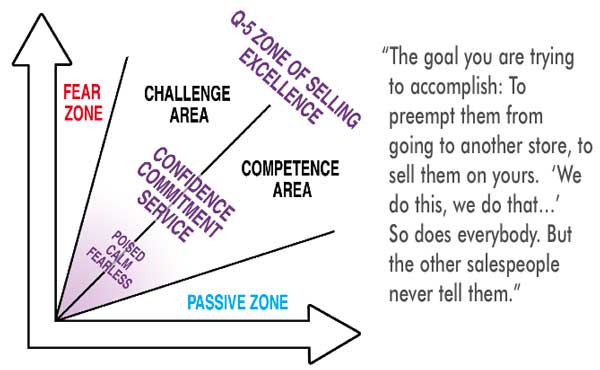
Most of us tend to naturally gravitate toward either challenge or competence. There are those daring souls who love challenge, and in contrast, those others who are constantly honing skills they already have mastered. Harry Haight is a guy who loves taking risks, but who never takes time to fully master new skills. Sooner or later Harry overreaches, and ends up in the fear zone. On the other hand, those who stay at the same level of competence and who constantly make fear choices rather than growth choices end up in the static passive zone. The master salesperson wisely balances risk with competence. Measured and wise growth choices are the essence of the Q-5 selling philosophy.
Develop Strategic and Tactical Competences
When you are in the zone and you have mastered your level of competence, it’s time to take another step up the ladder. Salespeople get an abundance of advice about tactical techniques in selling. But there is very little advice about strategy. When you reach the level of competence mastery, it’s time to think strategically. Tactics such as eye contact, wearing a friendly smile, emanating confidence, enthusiasm and caring, following-up and so on are all good. But it is strategy that separates the world class performers from the ordinary salespersons. You need great tactics, but you also need a game plan.
Where do you want to be in your career this time next year? This is the question you must answer, this is your strategic vision.
Beyond this, there is the daily, strategic sales presentation to consider. I only have a limited amount of space to cover strategic selling sequences, so I will give one example. The late Chet Holmes came up with this one. (It was featured in a $15,000 Jay Abraham program.) When a couple comes into your place of business, ask yourself: “What is the ultimate perception I want this couple to have about my store?”
The tactical salesperson makes good eye contact with both people and gives a greeting: “Hello folks. How are you today?” And one of them says: “Oh, we are just looking.” “Fine, what are you looking for?” “Well, we were thinking about a mattress.” “OK. Right this way.” That’s a tactical salesperson who doesn’t even think about strategy.
The strategic salesperson says: “Oh really. Right this way to our mattress department.” On the way the strategic salesperson says: “Is this your first time in our store?” (Yes, no, it doesn’t matter.) “Well, let me tell you about our store. We have been serving this community for 52 years. We do this, we do that, we do this, we do that.” And this conversation is designed to develop strategic layers toward the goal you are trying to accomplish: To preempt them from going to another store, to sell them on yours. “We do this, we do that…” So does everybody. But the other salespeople never tell them. And it sounds really great when you say it.
What is your strategic objective? To establish your store as the most trusted, the most respected, the best place to get information and awesome service. All of your tactics–from informing them that you are factory-trained and are able to guide them to the perfect mattress, to obtaining referral leads–every tactic should be focused on achieving the strategic objective.
Two Greatest Salespersons
I began this article with the statement that possibly the best way to understand the Q-5 Salesperson is to think in terms of a generalization of common masculine/feminine gender-attitudes. The idea is that males tend more toward being assertive, while females tend naturally toward empathy and being helpful. The gist of my Q-5 theory is that an ideal blend of assertiveness and compassion creates the ultimate sales dynamic. It is not a coincidence that in my judgment the two greatest salespersons in the world are a male, Joe Girard, and a female, Marion Luna Brem. Their stories are inspirational and instructive, and every aspiring salesperson should read them.
Joe Girard (www.joegirard.com) has had an unparalleled sales career. He has been listed in the Guinness Book of World Records as “World's Greatest Salesman” for decades—a record that still stands today. He is the writer of four best-selling books on selling. Joe has sold more big ticket items, one-at-a-time, than any other salesperson in any retail industry. Joe got his start when he was virtually penniless and desperate in a fast-track automobile agency in Detroit. Because the dealership was fully staffed, he was not allowed to be on the showroom floor unless a customer came in and asked for him. So, Joe was given a tiny office and a phone and he began to make cold calls for prospects. Finally, after countless failed calls, he got a prospect. When “Joe Girard” was called on the loudspeaker, Joe almost had a heart attack. He entered the showroom, and when he saw his first prospect, he imagined a bag of groceries on the man’s head. That was his motivation. Joe made his first sale, and went on to blaze an extraordinary sales career. His first book was titled: “How to Sell Yourself”. Check out his website.
Coincidentally, Marion Luna Brem (www.marionlunabrem.com) also began her career in an automobile agency. In 1984, Marion was in even more dire circumstances than Joe Girard. Married with two young sons, Marion had her near-perfect home life shattered when she was diagnosed with a terminal illness and told she had only two to five years left to live. The stress of battling life-threatening cervical and breast cancer cost her marriage. Then, with no health insurance, no employment, and no resume, Marion, newly divorced and the head of her household, decided to try her hand at sales. She managed to sell her first automobile at the age of 32. By the time she was 36 Marion was President and CEO of her own auto dealership. Today, in 2012, she is internationally recognized for her successes. Marion has strategically opened several other companies including a second auto dealership in Texas as well as an ad agency and a real estate holding company. She has authored 2 books, “The 7 Greatest Truths About Successful Women” (ranked one of the “Top Ten Business Books”) and “Women Make the Best Salesmen”. She currently travels as an international motivational speaker. You may never read a more inspiring and instructive story than that of Marion Luna Brem.
These two sales pros exemplify the Q-5 principles. Yet each is unique. Joe Girard is more assertive, perhaps, but he developed a passion to serve each customer with relentless dedication. Marion Luna Brem seems more oriented toward the female quality of empathy, yet her drive and desire are equal to any male’s. It’s a matter of balance. The ultimate salesperson is the one who has developed a sales philosophy of enlightened self-interest. This philosophy modulates passion and commitment with an equal degree of empathy to help and serve clients. The result is excellence in sales performance.
Larry Mullins is a contributing editor for Furniture World and has 30+ years of experience on the front lines of furniture marketing. Larry’s mainstream executive experience, his creative work with promotion specialists, and mastery of advertising principles have established him as one of the foremost experts in furniture marketing. His affordable High-Impact programs produce legendary results for everything from cash raising events to profitable exit strategies. His newest books, THE METAVALUES BREAKTHROUGH and IMMATURE PEOPLE WITH POWER… How to Handle Them have recently been released by Morgan James Publishing. Joe Girard, “The World’s Greatest Salesman” said of this book: “If I had read Larry Mullins’ book when I started out, I would have reached the top much sooner than I did.” Larry is founder and CEO of UltraSales, Inc. and can be reached directly at 904.794.9212 or at Larrym@furninfo.com. See more articles by Larry at www.furninfo.com or www.ultrasales.com.